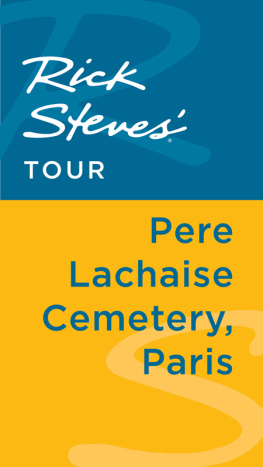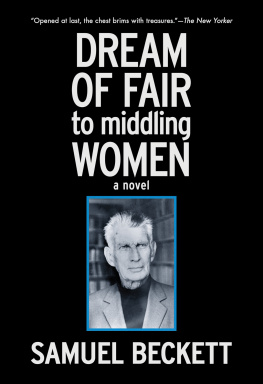AN IRAQI IN PARIS
An Autobiographical Novel
SAMUEL SHIMON
Translated from the Arabic by
Piers Amodia and Christina Phillips

First published in Arabic, 2005as Iraqi fi Baris
by Manshurat al Jamal
First published in English by Banipal Books,London 2005 (limited edition)
Revised English edition published in 2010 by
Bloomsbury Qatar Foundation Publishing
This electronic edition published in 2012 by
Bloomsbury Qatar Foundation Publishing
Qatar Foundation
Villa 3, Education City PO Box 5825
Doha, Qatar
www.bqfp.com.qa
Copyright Samuel Shimon, 2010
Translation copyright Christina Phillips and Piers Amodia 2010
The moral right of the author has been asserted
ISBN 978 9 9921 7903 1
All rights reserved.
You may not copy, distribute, transmit, reproduce or otherwise make available this publication (or any part of it) in any form, or by any means (including without limitation electronic, digital, optical, mechanical, photocopying, printing, recording or otherwise), without the prior written permission of the publisher. Any person who does any unauthorised act in relation to this publication may be liable to criminal prosecution and civil claims for damages.
Visit www.bloomsbury.com to find out more about our authors and their books You will find extracts, author interviews, author events and you can sign up for newsletters to be the first to hear about our latest releases and special offers
To the memory of
Sharif al-Rubaie, Nicolas Guillaume Royer,
Michel Farah, Ali Etman, Jean-Claude Ming,
Salih al-Azzaz, James Naughton
and my father
Only the autumn leaf fallen asleep
under the raindrops
knows my thirst
Samuel Shimon
Contents
You see, I got to America before you did, my mother declared laughing, as she watched me getting out of my uncles car. I had gone to Modesto to see my mother who was making her first visit from Baghdad to see her sister.
You killed us with your Hollywood! Its here, just a stones throw away. Do you know how to drive? Take one of your uncles cars and just go there!
As I approached her, I noticed she had become very old.
Oh my Shmuel, she cried, and she hugged me and started to cry. Suddenly she looked at me, with tears streaming down her face: Whats happened to your nose, is it still growing? she laughed.
I laughed too, and kissing her head and pointing at her feet, I said, Look at your socks, Mother! Youve had holes like those in your socks since I was a child!
Where have you been all these years, son?
Before I could respond, she added, You know, Shmuel, just a few moments after we named you, I grew very sad and told myself that with such a name we were placing too much on the shoulders of this baby!
California, January 2004
A Report for the French Refugee Department
One morning in January 1979, I woke up and immediately looked up at the clock hanging in the hall to see that it was nearly six oclock. That was good because the bus that would take me from Baghdad to Damascus wasnt leaving until half past nine. I had packed my little suitcase before going to bed the night before. I looked at my family. They were still asleep in the large room that we used as a bedroom at night and a living room during the day. They slept in their day clothes on the threadbare mattresses spread out on the damp cement floor. My mother was sleeping in the middle of the room, and beside her were my two little sisters Nahrain and Mary. On the far side of the room, Robin and John were sleeping next to one another, and my father slept on a heap of old clothes in a corner at the back, while Teddy and Samson were on the two long wooden benches in the hall. I lay down next to my mother and kissed her head, whispering in her ear, Mum, Mum, Mum. Wake up, Mum! Youre usually awake at this time, why not today? Please wake up! Im going, Im leaving soon, and you might never see me again. Have you gone crazy? my entertain her with stories of my childhood and my love of movies. After each evenings show I would see her back to her apartment and then return to my hotel. One day she told me, You can stay here. When I excused myself, she looked at me strangely. The same thing happened during the following days, and Valrie noticed I was avoiding touching her. Every time I thought of telling her that I was still suffering from my recent operation, my courage failed. Because of my great stupidity, I preferred to keep out of her sight for some days. When I felt that my health was better, I bought a bouquet of flowers and went to her apartment. I knocked on the door and it was opened by a young African guy. I said I was looking for Valrie and he said she was taking a shower. I said I was an old friend of hers and he said he was her new friend and that he was from the Ivory Coast. I gave him the flowers and said I would pass by to greet Valrie another day. The young man laughed and closed the door.
The agent in the Department for Refugees stood up from his chair holding my papers. Are you sure he was from the Ivory Coast?
Who?
The young man who stole your girlfriend.
I think so. Is that important for my asylum application?
No, no, said the man, laughing, I just wanted to know.
A shared-ride taxi that can accommodate up to five passengers.
Al-Tanjawi, means the person from Tangiers.
The 500-franc note depicted the head of Blaise Pascal.
Monsieur Propre is Mr Clean, a cleaning product. It is also an abbreviation for the owner, le propritaire.
Al-Hindi means Indian in Arabic, but is also a family name.
Pickthall, Mohammed Marmaduke. The Meaning of the Glorious Quran. Hyderbad-Deccan: Government Central Press, 1938. Sura 2, verse 255, online edition.
France, January 1985
From the very beginning of my stay at Le Rocheton Centre for Refugees, 70 kilometres outside Paris, I convinced myself that it was just the sort of charming place I needed to write the script I had wanted so long to write. Indeed, within a few weeks I had written several scenes of a script I was calling Nostalgia for the English Time, the story of a small Iraqi village at the end of the fifties after the British had left.
I shared a large clean room with Rahim, a refugee from Afghanistan, and I was lucky my typewriter was manual since Rahims love story with an Ethiopian refugee a woman with a big sexual appetite as it happened forced me out of the room two or three times a day. Whenever Rahim wanted to sleep with her he asked me to leave for a while. I would take my typewriter and go off and work somewhere in the centres big garden. I often went deep into the woodland, and sometimes felt I was really a refugee in Rahims place, not in France.
She wants to do it, not me, believe me! Rahim would say, smiling bashfully.
Each time I came across the Ethiopian girl in the corridor leading to my room shed boldly ask, Hows the writing going? When are you going to finish the script so we can read it? Once she said, All night I can hear the sound of your typewriter coming through my window, tak, tak, tak. You have to take a break.
I was on the verge of replying, My dear, why dont you take a little break? You go tak, tak, tak three times a day in my room and youre still not satisfied! But I said nothing.
Many of the male refugees had liaisons with the girls. The Hungarian guy, who insulted the Russians at every opportunity, never left the room of the lazy blonde Polish girl. I dont know how I ever visited her room it was like a garbage bin, filled with the nauseating stench of Gitanes cigarettes. Then there was the Turk Kamal, who found a way to have a relationship with Marina, a plump Russian widow who often urged Kamal to attack the Pig, her name for the pot-bellied fair-haired Hungarian. Meanwhile you would see Johnny, the South African, playing table tennis all day with Zeinab, an Iranian. I dont know whether or not their relationship went beyond ping pong.



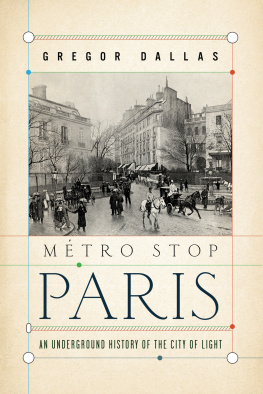
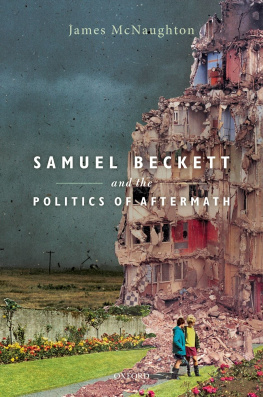
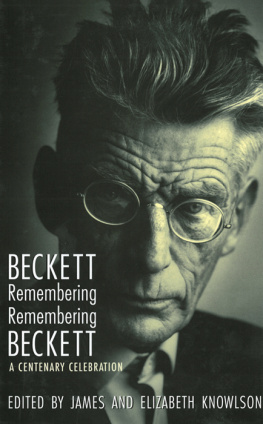
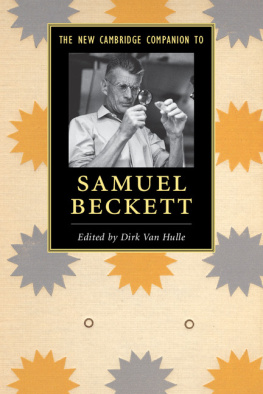
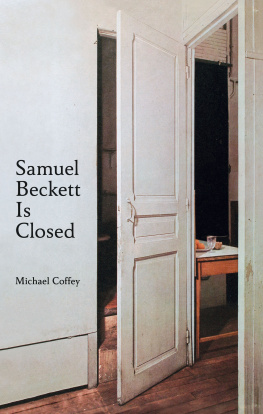
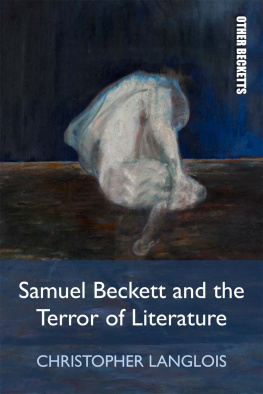
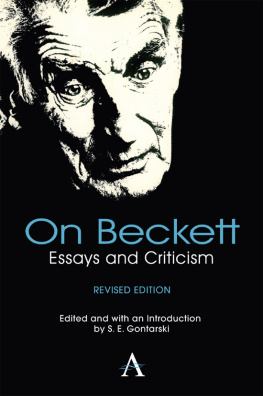
![Samuel Beckett [Samuel Beckett] - The Complete Dramatic Works](/uploads/posts/book/72751/thumbs/samuel-beckett-samuel-beckett-the-complete.jpg)
